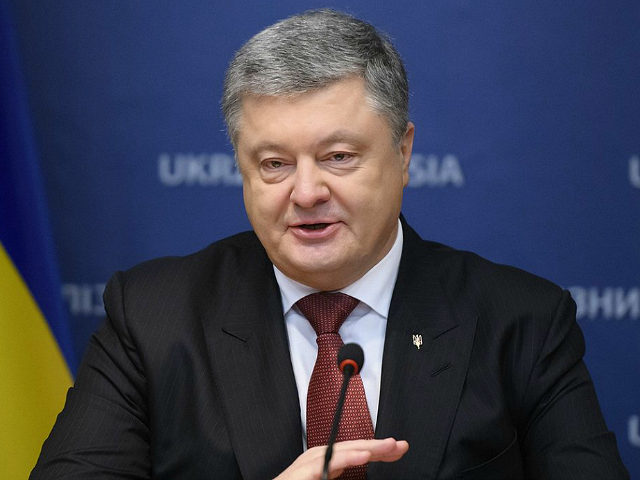The Trump administration on Thursday approved the sale of 210 Javelin anti-tank missiles and 37 launchers to Ukraine, a deal valued at $47 million.
Ukrainian President Petro Poroshenko quickly expressed gratitude to President Donald Trump for making the sale, while the Russians were considerably less pleased.
“I’m thankful to President Donald J. Trump and his entire team for supporting Ukraine in this important and historic decision,” Poroshenko wrote on Facebook.
“Only unity and solidarity will stop the Russian aggressor and preserve the Free World from his maniac ambitions!” he added, in case anyone had any doubts where those Javelins would be aimed.
“Ukraine is a critical ally to the United States, and I am so pleased to see our country provide this long-overdue assistance in Ukraine’s fight to push back against growing Russian aggression. Providing lethal aid to Ukraine shows that the United States is serious about protecting the interests of our nation and our allies,” said Sen. Joni Ernst (R-IA), who chairs the Senate Armed Services Subcommittee on Emerging Threats.
“The deal will support President Trump’s claims that he has been tougher on Russia over Ukraine than the Obama administration,” the Financial Times anticipated. “Mr. Trump’s predecessor in the White House imposed economic sanctions on Russia but refused to provide Ukraine with lethal arms, fearing it could provoke Moscow into ratcheting up a conflict that has already claimed more than 10,000 lives.”
The Pentagon, however, said the proposed sale would “help Ukraine build its long-term defense capacity to defend its sovereignty and territorial integrity” without changing the military balance of power in the region.
Ambassador Kurt Volker, the U.S. special representative for negotiations with Ukraine, argued that an anti-tank missile is an entirely defensive weapon because it “sits in a box and doesn’t get used unless you have a tank coming at you.”
Implicit in this seemingly tautological argument is that Russia has nothing to worry about if its denials of supporting separatist militia forces in Ukraine are true as there is no way the separatists could acquire tanks without Russian support.
The process of approving the missile deal has been underway since December when President Trump initially approved the sale and notified Congress. Congress could block the sale within the next 30 days, although this is seen as an unlikely outcome.
Russia’s response to Thursday’s news has been restrained so far, but back in December, the Russian Foreign Ministry thundered that the U.S. “in a certain sense crossed the line” by announcing its “intention to transfer weapons of direct damaging action to Ukraine.”
“American weapons can lead to new victims in our neighboring country, to which we cannot remain indifferent,” the Foreign Ministry said, which is why Volker needled the Russians about anti-tank missiles being entirely harmless if there are no tanks available to use them on.
The anti-tank missile deal features prominently in analyses that find U.S.-Russian relations at a post-Cold War low point, or perhaps even worse than they were during much of the Cold War. Diehard true believers in Trump-Russia conspiracy theories will not easily digest the undeniable truth that the Trump administration is much harder on Russia than its predecessor ever was, especially in Ukraine and Syria.
The major anomaly in this tougher Trump administration stance is that President Trump has a tendency to speak well of Russian President Vladimir Putin — which is either a clever diplomatic ploy, a sign of chaos within the Trump administration, President Trump speaking in his characteristic off-the-cuff manner about Putin qualities he admires, or President Trump saying nice things about Putin because he knows it drives the U.S. media crazy, depending on who you ask.
The stress points Russia is using to expand its geopolitical influence are all relics of the Obama administration: the Islamist chaos unleashed by the Arab Spring, which Obama badly misread as a flowering of enlightened democracy; the growing power of Russia’s partner in the Middle East, Iran; the disastrous Obama intervention in Libya; Obama allowing Russia to take control of the Syrian civil war; and Putin’s skulduggery in Ukraine. Criticism of how Donald Trump plays the cards he has been dealt is fair enough, but no one should deny Barack Obama dealt the cards.
It remains to be seen just how many chips Putin is willing to put on Ukraine, which was intended to be the first of several steps to restore Russia as an imperial power, or at least convince Russian voters to see one when they look in the mirror.
Others see Russia’s annexation of Crimea and support for Ukraine separatists as part of a subtle “hybrid warfare” effort waged by China and Russia to weaken the West without the kind of overt provocation that might provoke a strong response from the U.S. and its allies. The Javelin missile sale may help pressure the Russian leader into deciding if he wants to play any more cards in a Ukraine gambit that continually threatens to spiral out of his control.

COMMENTS
Please let us know if you're having issues with commenting.